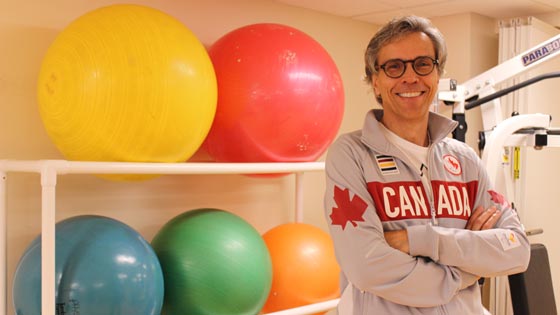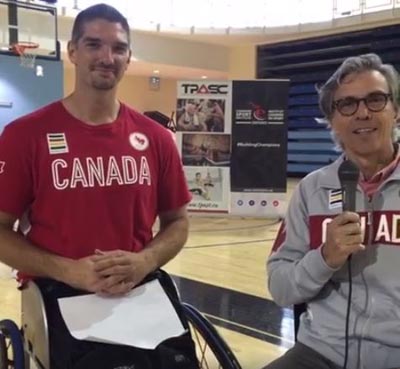
Dr. Gaetan Tardif, Program Medical Director at Toronto Rehab, is representing Canada as the President of the Canadian Paralympic Committee in Rio for the 2016 Paralympic Games.
(Photo: UHN)
The Paralympic Games begin today and run until Sept. 18 in Rio de Janeiro, Brazil.
From Wheelchair Basketball to Powerlifting, more than 4,300 athletes are going for gold in 22 different sports.
UHN News sat down with Dr. Gaetan Tardif, Medical Director at Toronto Rehab, who will be representing Canada as the President of the Canadian Paralympic Committee in Rio. He has the scoop on what we can expect from this year's Paralympics.
For readers who may not be familiar with the Paralympic Games, what are the Games and who competes?
The Paralympic Games are a major multi-sport event, one of the largest in the world.
The Games are for athletes with all types of physical impairments, and in some cases intellectual impairments. They are not for participation, they are for competition. In fact, there are very tight standards – so unless you have a specific time you don't get to go, and even if you do have a specific time it depends on how many people have a better time.
It's extremely competitive and people have to train really hard. Most athletes don't have time for full-time jobs.
Related to this story:
While there are athletes with intellectual impairments who participate in the Paralympics, the Paralympic Games are not the same as the Special Olympics. What is the difference between the two events?
The Special Olympics are purely for people with intellectual disabilities. But in the Paralympics, most types of disabilities are represented. The main categories for the Paralympics are physical types of impairments, such as musculoskeletal system impairments; visual impairments; and intellectual impairments.
The same way you have weight classes in boxing or judo, there are classes in the Paralympics. Not every athlete with a spinal cord injury is in the same category. If your disability impacts you less, then you're in a category with people with disabilities of lesser impact. If your disability is really quite severe, you're in a category with people of higher levels of disability.
What do you want people to know about the Paralympics?
It's fantastic sport. Because it's different, it's particularly interesting because it gives us something new to learn about sport. But that can also be a challenge because if you don't fully understand a sport it's difficult to appreciate. We always try to explain the sport quickly in our media coverage. Once you get the rules, Paralympic sports is quite addictive!
How will this year's Paralympic Games be different than the Paralympics of the past?
There are two new sports this year: one is para-canoe and the other is para-triathlon. We've got talent in both and gold medal hopes in para-triathlon.
We're also going to have more coverage than ever. The coverage has increased for every Games since I've been involved. This year, we're probably going to have about 60 hours of original television, a lot of it live, and hundreds and hundreds of hours of live streaming. The best way for people to find out where they can watch is to visit
The Canadian Paralympic Committee website.
How do the Paralympic Games add momentum to the parasport movement?
We want any parent, friend, relative of a youngster with a physical impairment to watch the Games and say, 'Why don't we try that?' because those are the people that will get us our gold medals in the future.
A large number of our athletes started in sport after initially thinking, 'I'm a kid with a disability, and there might not be much I can do.' Then they watched television and saw people with the same impairment who showed them what they could do. That really creates a momentum both to build elite sport and to build really good life habits in terms of physical activity - not all of us will be Olympians or Paralympians, but we should all be physically active.
The Paralympics create good role models, a push to have the right types of facilities built within our communities, and a push to build communities that are universally accessible as well. The Paralympics are fantastic sport with a big component of social progress.
Apart from additional coverage, how have you seen the Games evolve?
The level of performance has steadily increased over the years. It's gotten tougher and tougher for athletes to make it to the podium and they need top science, equipment and coaching to aspire to be the best in the world.

The other thing that has really changed is the top countries in the medal count. Twenty years ago, Canada would finish top five in the medal count, along with other countries where there was already a pretty good acceptance of people with disabilities.
Then other countries looked at that and said, 'Well that looks really neat.' For instance, China has now made it a mission to put a Chinese athlete on every podium and other countries have invested heavily in their Paralympic Sport infrastructure, and it shows on the medal count.
In a way, we've been victims of our own success. We wanted to show people this was great sport and beneficial for the country, and then other countries took it to heart and now they've become huge competition for Canada. I'm ambivalent – I like finishing at the top but I'm really happy that Canada was a leader in promoting sport for people of all abilities around the world.
How has your role as Medical Director at Toronto Rehab impacted your work as President of the Canadian Paralympic Committee and vice-versa?
One of the things I've seen shifting over the years as Medical Director is that the patient population has changed. It wasn't unusual 50 years ago if you had a significant disability that your life expectancy wasn't great – even if you were a young person.
What we've realized over the years is that you have to keep moving, you have to exercise, and it's important even for people with pretty significant types of injuries or disabilities. There are ways to keep everyone moving – whether you have a physical disability or not.
Some of the athletes in the Paralympics have an acquired disability – how do hospitals such as Toronto Rehab help people with acquired disabilities find their way to sport?
It is a challenge, because people are with us in the hospital for a short period of time and then they return to their communities. So we need our professional staff to build awareness that this is in the not-so-distant future for people and link them with the appropriate community agencies.
The Cottage Program at Lyndhurst is one of the few opportunities we are able to provide that is directly related to sport. Other than that we connect people with community programs and organizations that can help them re-integrate to sport and give them a chance to try new things.
What will your day-to-day be like at the Games?
In my capacity as the President of the Canadian Paralympic Committee, I have to make sure the operations are doing well, that the athletes feel supported and that I take this rare opportunity to connect with people from other countries to exchange ideas and learnings.
It's a chance to help influence the future of the Paralympic movement. It's about connecting with like-minded countries to continue to further the movement.
What are you personally looking forward to the most?
What I enjoy most is wandering around the Athletes' Village. I love the competition and everything, but the best thing is that you get in to the Village and you see people of all abilities, all ethnic backgrounds, different ways of dressing, come together.
The world and its complexities are there for you to experience. That's the neatest part about going to the Paralympics.
There is nowhere you can see the world like you would in the Paralympic Village.
Follow Dr. Gaetan Tardif's road to Rio through
his blog here and by following
his Twitter account, where he'll be posting updates throughout the Paralympic Games.
